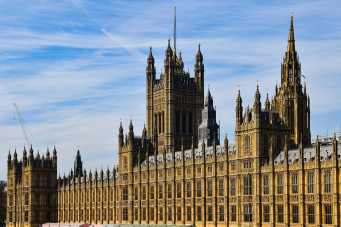
Game of Phones & Screens: an Industry’s Grab for Audience, Influence, Content and Platforms
The TV industry in 2017 is evolving more quickly than ever.
As well as the emergence of new technologies and the growing impact of over-the-top (OTT) services such as Netflix and Amazon Prime, content owners and huge industry players are consolidating their businesses like never before.
Telecoms companies are now offering TV packages. TV businesses have started to offer mobile. And other deals involve media companies looking to grow their reach in new markets.
So is this trend about audience, influence, content, platforms or technology? Or a combination of some of those things?
What’s the underlying strategy being followed?
We look at four recent mergers, acquisitions and collaborations to help understand the state of our industry at the dawn of 2017.
Case 1: Vodafone and Liberty Global collaborate

Liberty Global, the world’s largest international TV and broadband company, entered, last February, a joint venture with Vodafone “to create a national unified communications provider in the Netherlands with complementary strengths across video, broadband, mobile and B2B services.”
Vodafone agreed to sell its Dutch consumer fixed-line business to enable the deal to go ahead, as demanded by the European Commission, who were concerned about competition in the telecoms market.
This move is about more than just two companies grabbing what they didn’t previously have, however. Vodafone and Liberty Global hope to save around €280 million as a result of the collaboration, which will allow them to offer bundles of cable TV, broadband and mobile to their combined 15 million customers.
This deal is among several in the TV-and-telecoms market through which companies offer similarly packaged deals to customers, as discussed below.
Liberty Global’s billionaire chairman, John Malone, stated recently that a major TV company could blur business lines further by acquiring T-Mobile, the telecoms giant:
As business lines begin to blur with phone providers like AT&T Inc. offering live TV over broadband, [Liberty Global chairman, John] Malone said a cable industry response could be possible. AT&T, the owner of DirecTV, recently agreed to buy Time Warner Inc [the parent company of HBO]. for $85.4 billion, a deal that will require regulatory approval from the new administration.
Case 2: Sky & BT enter the mobile market

The deal struck between Vodafone and Liberty Global in Netherlands was not the first of its kind. We wrote in September 2015 that both BT and Sky had entered the mobile market, becoming what are known as ‘quad players’, meaning they’re able to offer four services – home phone, mobile, TV and broadband – in a single package for customers.
BT acquired the UK’s largest mobile operator, EE, in a £12.5 billion takeover, while Sky has recently launched its own mobile service using O2’s network.
So what’s the driver behind this trend?
Given the audience size that Sky has, as discussed above, and BT’s grab for content (particularly top-level sports competitions, such as Premier League and Champions League football) in recent years, these moves appear to be more about consolidation through a ‘land grab’ of established platforms.
With more and more people accessing the internet via their mobile phones than desktop or laptop computers – and an ever-increasing amount of video being watched and shared online – moves such as those by Sky, BT and Virgin make sense.
In order to stay in the game, they recognised what they lacked (a mobile platform through which they can promote their content) and have thrown cash at the problem to make the biggest (and, strategically, most sensible) move they could.
Case 3: 21st Century Fox’s proposed takeover of Sky

As 2016 drew to a close, news broke of a proposed takeover by 21st Century Fox of Sky, which is Europe’s biggest pay television broadcaster and valued at £18.5 billion.
Sky has 21 million subscribers in the UK, Ireland, Germany, Italy and Austria, and 21st Century Fox – who tried unsuccessfully to take over the company in 2011 – already owns 39 per cent of the business.
With a customer base of that magnitude, Sky was always going to be an attractive proposition.
But is the deal about more than subscriber numbers?
The size of that audience is key, of course, and those who have heavily criticised the proposed deal are concerned at the influence that could be exerted by what would be the most powerful media group in the UK.
Rupert Murdoch, executive chairman of 21st Century Fox and owner The Sun and The Times newspapers, will now need to gain regulatory approval for the deal to go through, as well as the backing of his company’s shareholders.
But what’s the thinking behind this deal? What does it mean for the industry? It’s pretty clear that what the company lacks in content it can make up with audience, as investment website fool.co.uk said:
Fox is under pressure to increase revenues amid a hostile media environment. Where cable providers such as Fox used to reign supreme, it’s now the content producers that have the edge as streaming sites such as Netflix and Amazon Prime take over the traditional pay-TV market. Fox does produce some of its own content, but the brand needs size and diversification to take on its peers effectively. Sky offers just that.
Case 4: AMC Networks teams up with United Group

The final deal under the Frame 25 spotlight is AMC Networks’ collaboration with United Group, a prominent telecom and pay-TV provider in the Balkans, that will double AMC’s reach in the fast-growing region and give it access to one million homes.
So AMC had the content, but wanted a bigger audience and a new way to reach them.
In conclusion
We’ve seen TV companies enter the mobile market, telecoms companies team up with or acquire content owners, and at least one content-based firm push into a new market to reach a larger audience.
What we haven’t seen (yet) is a merger or acquisition involving one of the big OTT companies, either with a telecoms business or even one of the huge tech firms.
Could Netflix could be a great acquisition target for the likes of Apple?
Chief executive of the OTT provider, Reed Hastings, stressed in October 2016 that his company’s success is based on a commitment to service and content – not deals:
That’s what made us successful for the last 14 years…we’ve done no M&A [mergers and acquisitions]. We’ve stayed out of all those discussions. We don’t do bankers meetings. We’re very old school in that way. Let’s just build the greatest service on earth…it’s done very well for our shareholders.
Forbes.com goes further, suggesting that Disney could “rescue ESPN from a slide” and “should buy Netflix, Paramount, and Sony”:


Netflix, Paramount and Warner Bros.: What the Deal Means for the Broadcast and Production Industry

How the Employment Rights Act 2025 Is Reshaping the Freelance Market
